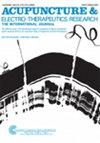时间因素对针刺治疗脑卒中后失眠的影响:一项系统回顾和荟萃分析
IF 0.4
4区 医学
Q4 INTEGRATIVE & COMPLEMENTARY MEDICINE
Acupuncture & Electro-Therapeutics Research
Pub Date : 2021-01-01
DOI:10.3727/036012921x16237619666021
引用次数: 0
摘要
目的通过系统回顾和荟萃分析,分析颞叶因素对针刺治疗脑卒中后失眠的影响。方法检索自成立以来至2019年9月的8个数据库,无语言限制。将单纯针灸与西医治疗中风后失眠进行比较,纳入随机对照试验(RCTs)。结果纳入32项研究,共2347名受试者。与西医比较,亚组分析显示,上午9-12点、下午3-6点、睡前2小时开始针灸治疗脑卒中后失眠在提高有效率(P=0.66)和睡眠质量(P=0.95)方面均无统计学意义。累积荟萃分析显示,随着治疗量的增加,置信区间逐渐缩小,效应值的准确性逐渐提高。结论在睡前2小时进行针灸治疗,根据午夜-正午潮落理论,可以通过安神引阳入阴来改善失眠。临床上最常用的留针时间为30分钟有效,随着刺激量的增加,针刺的治疗效果可以持续稳定。由于偏倚的总体风险评估为不明确,因此这些结论的应用需要谨慎。本文章由计算机程序翻译,如有差异,请以英文原文为准。
The Affection of Temporal Factors on Acupuncture for Insomnia after Stroke: A Systematic Review and Meta-Analysis
Objective The aim of this systematic review and meta-analysis was to analyze the affection of temporal factors on acupuncture for insomnia after stroke. Methods Eight databases were searched from inception through September 2019 without language restrictions. Randomized controlled trials (RCTs) were included if pure acupuncture was compared to Western medicine for the treatment of insomnia after stroke. Results Thirty-two studies involving a total of 2347 participants were included. Comparing to Western medicine, the subgroup analysis showed there was no statistical significance among 9-12 am, 3-6 pm, and 2 hours before sleep to start the acupuncture for post-stroke insomnia on improving the effective rate (P=0.66) or the sleep quality (P=0.95). The cumulative meta-analysis showed that with the amount of treatment increased, the confidence interval was narrowed and the accuracy of the effect value was improved gradually. Conclusions The results of this study showed that acupuncture therapy was performed 2 hours before sleep, the insomnia could be improved by calming the mind and inducing the Yang into the Yin based on the theory of midnight-midday ebb flow. The most commonly used needle retention time of 30 minutes was effective in clinical, and with the amount of stimulation increases, the therapeutic effect of acupuncture could be sustained and stable. Since the overall risk of bias was evaluated as unclear, application of these conclusions needs to be cautious.
求助全文
通过发布文献求助,成功后即可免费获取论文全文。
去求助
来源期刊

Acupuncture & Electro-Therapeutics Research
医学-全科医学与补充医学
CiteScore
0.50
自引率
66.70%
发文量
9
审稿时长
>12 weeks
期刊介绍:
The aim of the journal is to provide an international forum for the exchange of ideas and promotion of basic and clinical research in acupuncture, electro-therapeutics, and related fields. The journal was established in order to make acupuncture and electro-therapeutics a universally acceptable branch of medicine through multidisciplinary research based on scientific disciplines. The final goal is to provide a better understanding of both the beneficial and adverse effects of these treatments in order to supplement or improve existing methods of diagnosis, prognosis, treatment, and prevention of diseases in both Western and Oriental medicine.
 求助内容:
求助内容: 应助结果提醒方式:
应助结果提醒方式:


